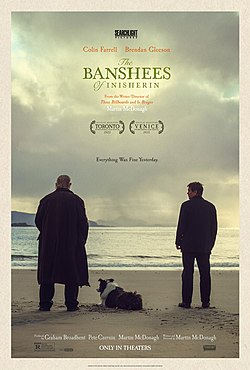
It would be easy enough to call this Martin McDonagh's best film, because I was never more than mildly amused with his hipster hit man farce In Bruges and the diminishing returns of the cynical pseudo-quirk of Seven Psychopaths and the flatulently condescending Three Billboards. All of his style and stars are attractive enough, but his films have never had much heart, much less heart than his brother, John Michael, managed in his superior films like The Guard and Calvary. Banshees, which roots McDonagh in his Irish clime, is perhaps his attempt to rectify this discrepancy. Perhaps the fraternal tension is instructive. By coincidence, I had just rewatched Mickey & Nicky shortly before Banshees, which is a similar tale of, not sibling exactly, but the deterioration of brotherly bonding. McDonagh's setting of the Irish Civil War may be a bit on-the-nose, but, unlike Billboards, at least it's on something. Whatever cultural/partisan strife that McDonagh was imagining he was skewering in Billboards is more faithfully explored in Banshees anyway, and although its resolution is still murky and without a lot of emotional insight, it is still more exemplary of what Armond White described as a contemporary "sickness of soul" (White was not a fan of the film), which in turn reminds me of that open letter that non-critic Donald Fagen wrote to Wes Anderson after watching the similar fraternal dissolution in his Darjeeling Limited. (That latter film received none of the awards and accolades as Banshees, but is the more profound and amusing of the two films.)
Banshees is less reluctantly empathic than McDonagh's other films, which is welcome, but the true liberating spirit appears to be the sister character of Siobhan (suppoting actress nominee Kerry Condon) who manages to extricate herself in a minimally self-destructive fashion. I suppose that's some representation of progress, as is the film's more earnest embrace of its own insecurities, even when they may manifest in embarrassing gratuity. Write what you know.
8/10

Given this film's storied troubles at being made at all, a certain amount of grace is required to excuse its compromised condition. Famously documented in the Lost in La Mancha documentary, this is the Terry Gilliam project that he finally managed to complete in 2018 after the original shoot collapsed nearly 20 years earlier. Johnny Depp has been replaced with the suitably swarthy Adam Driver as our not-entirely-complicit Sancho Panza, and the late Jean Rochefort is replaced by Jonathan Pryce as our incorrigible Quixote. Both leads are quite fun, and keep the film engaging, but the fatal flaw is an absence of Gilliam's typical zest. There are spare visionary moments, an inspired kink to weave the troubled production history into the plot, but there's also an inescapable sense of exhaustion, as if this is *good enough* and let's be happy it got made at all.
7/10





















 Jinnistan wrote:
Jinnistan wrote:
